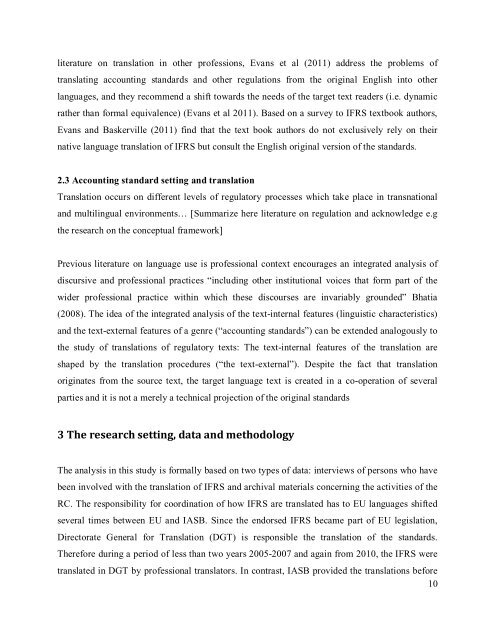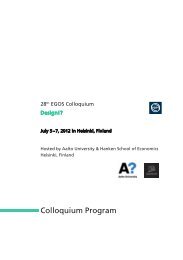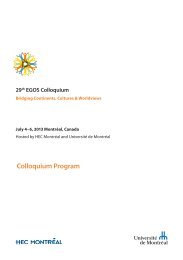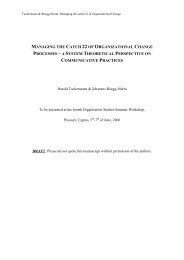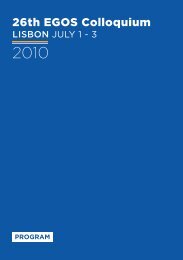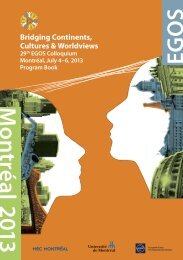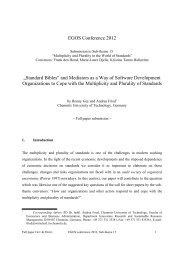A single set of standards and the multiplicity of interpretations - EGOS
A single set of standards and the multiplicity of interpretations - EGOS
A single set of standards and the multiplicity of interpretations - EGOS
You also want an ePaper? Increase the reach of your titles
YUMPU automatically turns print PDFs into web optimized ePapers that Google loves.
literature on translation in o<strong>the</strong>r pr<strong>of</strong>essions, Evans et al (2011) address <strong>the</strong> problems <strong>of</strong><br />
translating accounting <strong>st<strong>and</strong>ards</strong> <strong>and</strong> o<strong>the</strong>r regulations from <strong>the</strong> original English into o<strong>the</strong>r<br />
languages, <strong>and</strong> <strong>the</strong>y recommend a shift towards <strong>the</strong> needs <strong>of</strong> <strong>the</strong> target text readers (i.e. dynamic<br />
ra<strong>the</strong>r than formal equivalence) (Evans et al 2011). Based on a survey to IFRS textbook authors,<br />
Evans <strong>and</strong> Baskerville (2011) find that <strong>the</strong> text book authors do not exclusively rely on <strong>the</strong>ir<br />
native language translation <strong>of</strong> IFRS but consult <strong>the</strong> English original version <strong>of</strong> <strong>the</strong> <strong>st<strong>and</strong>ards</strong>.<br />
2.3 Accounting st<strong>and</strong>ard <strong>set</strong>ting <strong>and</strong> translation<br />
Translation occurs on different levels <strong>of</strong> regulatory processes which take place in transnational<br />
<strong>and</strong> multilingual environments… [Summarize here literature on regulation <strong>and</strong> acknowledge e.g<br />
<strong>the</strong> research on <strong>the</strong> conceptual framework]<br />
Previous literature on language use is pr<strong>of</strong>essional context encourages an integrated analysis <strong>of</strong><br />
discursive <strong>and</strong> pr<strong>of</strong>essional practices “including o<strong>the</strong>r institutional voices that form part <strong>of</strong> <strong>the</strong><br />
wider pr<strong>of</strong>essional practice within which <strong>the</strong>se discourses are invariably grounded” Bhatia<br />
(2008). The idea <strong>of</strong> <strong>the</strong> integrated analysis <strong>of</strong> <strong>the</strong> text-internal features (linguistic characteristics)<br />
<strong>and</strong> <strong>the</strong> text-external features <strong>of</strong> a genre (“accounting <strong>st<strong>and</strong>ards</strong>”) can be extended analogously to<br />
<strong>the</strong> study <strong>of</strong> translations <strong>of</strong> regulatory texts: The text-internal features <strong>of</strong> <strong>the</strong> translation are<br />
shaped by <strong>the</strong> translation procedures (“<strong>the</strong> text-external”). Despite <strong>the</strong> fact that translation<br />
originates from <strong>the</strong> source text, <strong>the</strong> target language text is created in a co-operation <strong>of</strong> several<br />
parties <strong>and</strong> it is not a merely a technical projection <strong>of</strong> <strong>the</strong> original <strong>st<strong>and</strong>ards</strong><br />
3 The research <strong>set</strong>ting, data <strong>and</strong> methodology<br />
The analysis in this study is formally based on two types <strong>of</strong> data: interviews <strong>of</strong> persons who have<br />
been involved with <strong>the</strong> translation <strong>of</strong> IFRS <strong>and</strong> archival materials concerning <strong>the</strong> activities <strong>of</strong> <strong>the</strong><br />
RC. The responsibility for coordination <strong>of</strong> how IFRS are translated has to EU languages shifted<br />
several times between EU <strong>and</strong> IASB. Since <strong>the</strong> endorsed IFRS became part <strong>of</strong> EU legislation,<br />
Directorate General for Translation (DGT) is responsible <strong>the</strong> translation <strong>of</strong> <strong>the</strong> <strong>st<strong>and</strong>ards</strong>.<br />
Therefore during a period <strong>of</strong> less than two years 2005-2007 <strong>and</strong> again from 2010, <strong>the</strong> IFRS were<br />
translated in DGT by pr<strong>of</strong>essional translators. In contrast, IASB provided <strong>the</strong> translations before<br />
10


